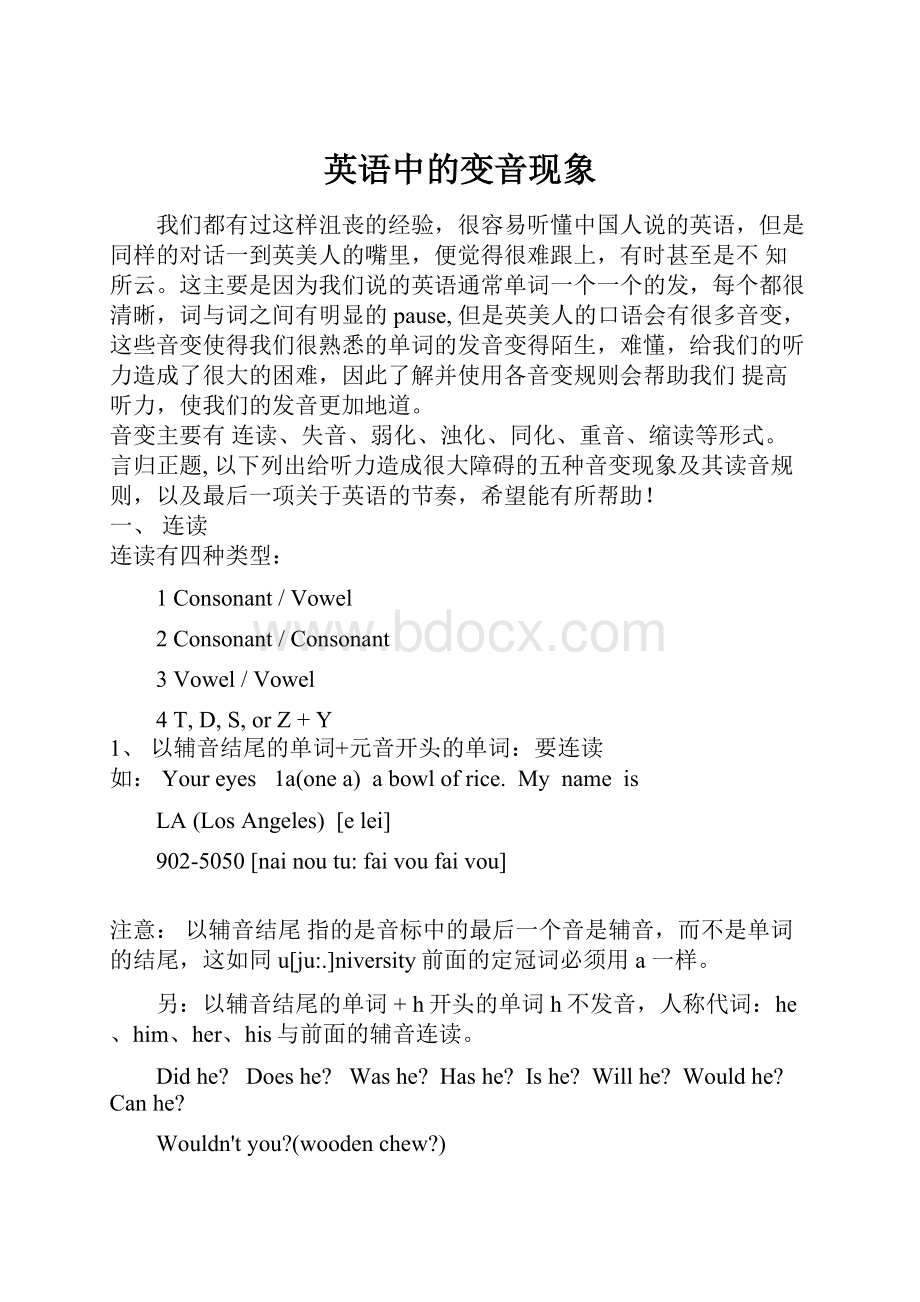英语中的变音现象.docx
《英语中的变音现象.docx》由会员分享,可在线阅读,更多相关《英语中的变音现象.docx(9页珍藏版)》请在冰豆网上搜索。

英语中的变音现象
我们都有过这样沮丧的经验,很容易听懂中国人说的英语,但是同样的对话一到英美人的嘴里,便觉得很难跟上,有时甚至是不知所云。
这主要是因为我们说的英语通常单词一个一个的发,每个都很清晰,词与词之间有明显的pause,但是英美人的口语会有很多音变,这些音变使得我们很熟悉的单词的发音变得陌生,难懂,给我们的听力造成了很大的困难,因此了解并使用各音变规则会帮助我们提高听力,使我们的发音更加地道。
音变主要有连读、失音、弱化、浊化、同化、重音、缩读等形式。
言归正题,以下列出给听力造成很大障碍的五种音变现象及其读音规则,以及最后一项关于英语的节奏,希望能有所帮助!
一、连读
连读有四种类型:
1Consonant/Vowel
2Consonant/Consonant
3Vowel/Vowel
4T,D,S,orZ+Y
1、以辅音结尾的单词+元音开头的单词:
要连读
如:
Youreyes 1a(onea) abowlofrice. My name is
LA(LosAngeles) [elei]
902-5050[nainoutu:
faivoufaivou]
注意:
以辅音结尾指的是音标中的最后一个音是辅音,而不是单词的结尾,这如同u[ju:
.]niversity前面的定冠词必须用a一样。
另:
以辅音结尾的单词+h开头的单词h不发音,人称代词:
he、him、her、his与前面的辅音连读。
Didhe?
Doeshe?
Washe?
Hashe?
Ishe?
Willhe?
Wouldhe?
Canhe?
Wouldn'tyou?
(woodenchew?
)
Shouldn'tI?
(shudnnai)
Won'the?
(wonknee?
)
Didn'the?
(didnknee?
)
Hasn'the?
(hazaknee?
)
Wouldn'the?
(woodenknee?
)
Isn'the?
(isaknee?
)
Isn'tit?
(isanit?
)
Doesn'tit?
(duzanit?
)
Aren'tI?
(arenai?
)
Won'tyou?
(wonchew?
)
Don'tyou?
(donchew?
)
Can'tyou?
(canchew?
)
Couldyou?
(kudʒu:
?
)
Wouldyou?
(wud3ju?
)
Tellhimtoaskher….
Leavehim Forhim
Giveherabook. Giv-erabook.
Tellhimtoaskher. Tell-imtoask-er.
Whatwillhedo?
Whatwill-ido?
Wherewillhego?
Wherewill-igo?
Whenwillhecome?
Whenwill-icome?
whowillhemeet?
whowill-imeet?
Howwillheknow?
Howwill-iknow?
Hashegone?
Has-igone?
Hadhedoneitbefore?
Had-idoneitbefore?
Musthego?
Must-igo?
Canhedoit?
Can-idoit?
Shouldheleave?
Should-ileave?
2、辅音+辅音的连读
如果前面的单词结尾的清辅音,后面单词开头是与之相对应的浊辅音,或者相反,只发后面的辅音
t-d tʃ-dʒ s-z ʃ-ʒ p-b f-v k-g
sitdown Idon’tknow(发音再次的老师都不会发出[t]音)
Ijustdidn'tgetthechance.
Bigcake Dadtoldme Hugechange Goodnight
3、元音+元音
当前面的单词以元音结尾,后面的单词以元音开头,两个元音连读,连读的方法是在中间加w或者加j.以ou结尾的元音后面一般加w。
而以长元音i:
结尾的后面加j
Go(w)away who(w)is so(w)honest do(w)I?
she(j)is
但发这两个音的时候不要太强太故作。
不然的话还不如不发。
4、T,D,S,orZ+Y的连读:
当一个单词是以tdsz结尾,后面的单词是以y(j)开头的话要连读:
4-1 t+y连读成/tʃ/
What’syourname?
Can’tyoudoit?
I’llletyouknow.
4-2 d+y连读成/dʒu:
/
Didyouseeit
Howdidyoulikeit?
Couldyoutell?
4-3 s+y连读ʃ
Yes,youare
Blessyou
Guessyourage
4-4 z+y连读成ʒ
How’syourfamily?
Who’syourfriend?
When’syourbirthday?
呵呵!
我第一次知道这一连读规则时,兴奋不已,很容易的听懂了许多以前觉得很难以理解的句子,并且按照这种连读方式发音省力、轻松了许多。
二、失音
由于失去爆破是失音的一种现象,摩擦音也会被失去,所以统称为失音。
注意:
爆破音并不是完全失去,仍然形成阻碍,把气流堵在里面,但不爆破,直接发出相邻的辅音。
Disappearing/T/
关于/t/失音问题:
Thesound/t/tendstobeunstableinmanywordsandphrases.Sometimesit'sthere.Sometimesitisn't.Thereisaprocesscalledelisionwhichdeletes/t/whenitisprecededbyavoicelessconsonantandfollowedbyanyconsonantexcept/h/.Herearesomeexamples:
Christmas lastweek mostpeople actsensiblysoftwareinternational
Disappearing/d/
wesawthat/t/candisappearincertaincircumstances.Thesameistrueof/d/,butthecircumstancesareslightlydifferent.If/d/isprecededbyavoicedconsonant/bdgvDzZdZmnNl/anditisfollowedbyaconsonantotherthan/h/,thenitcanbedeleted(elided).Herearesomeexamples:
handbagoldmanusedto
Takentogether,thedisappearanceof/t/and/d/iscalledalveolarplosiveelision.
三、浊化
1、[S]后面的清辅音要浊化
[k]浊化成[g] sky Discussion:
[t]浊化成[d] Stand
[p]浊化成[b] speak Expression
还有[tr]—[dr] strike
2、美音中t在单词的中间被浊化成[d]
如:
writer,听起来和rider的发音几乎没有区别
letter—ladder outof
2-1在单词的前面或后面就不浊化比如:
Tedtooktentomatoes.first,coast,hot,late,fat,goat,hit,put,not,hurt,等。
2-2在过去式中ed的发音:
在清辅音后面发t:
laughed[la:
ft],picked[pIkt],hoped[houpt],raced[reist],watched[wa:
tʃt],washed[wa:
ʃt]
在浊辅音后面发d:
halved[hævd],rigged[rigd],nabbed[næbd],raised[reizd], smoothed[smu:
ðd]
Exceptions:
wicked[wikd],naked[nakd],crooked[kr¨1d],etc
T或d后面发/id/started founded
2-3t和n连在一起的时候,由于口位差不多,通常t就不发音了。
1.interview-innerview
2.Internet-innernet
3.twenty–twenny
4.winter–winner或winder
5.enter-enner或ender
美国人和加拿大人发音为了省事,习惯清音浊化,尤其是[t]在单词的中间一定会浊化成[d],但英国人发音不会这样,这也是英音和美音的一大区别。
了解这一浊化原则,会给听力带来一些帮助。
四、弱读
一般来说:
实词重读,如动词、名词、副词等;
虚词弱读,如介词、代词等
弱读的规则一般是:
元音音节弱化成[ə]或[ʌ]
比如说如下几个单词:
for/to/some/does/of
查字典会发现这些词都至少有两种读音,如for:
重读时[fɔ:
],弱读时[fə] to有三种读法[tu:
][tə][t] some也有三种读法[sʌm][səm][sm].does也有两种读法[dʌz][dəz] of居然有四种读法[ɔv][əv][v][f],没想到啊!
真是没想到啊!
举几个例子:
1、To的弱读:
to的前面是辅音弱读成t或tə today/t’dei/ tonight/t’nait/
wehaveto/hæftə/go.
To的前面如果是元音,那就弱读成d或də Igoto/goudə/work
ataquartertotwo Weplantodoit.
2、for的弱读:
在句中读/fər/句末读/fɔ:
r/
Thisisfor/fər/you.It'sfor/fər/myfriend.
Whatisthisfor/fɔ:
r/?
Whodidyougetitfor/fɔ:
r/?
3、and弱读成/n/
breadandbutter
4、or弱读成/ər/ Soupor/su:
pər/salad?
leftorright
5、are弱读成/ər/Whatareyoudoing?
Howareyou?
6、your弱读成/jər/How'syourfamily?
Isthisyourcar?
还有很多,希望多听,细心体会。
五、缩读:
我在网上下了个供大家参考
StandardEnglish
Reduced forms
example
because
kuz
Idon'twannagototheparty,kuzitsoundsboring.
betyou
betcha
Ibetchacan'teattenhotdogs!
couldhave+consonant
kuda
Youkudagonewithme,ifyou'dtoldmeinplentyoftime.
couldhave+vowel
kudav
Iwassohungry,Ikudaveatenahorse.
didyou
didja/didya
Didjalikethefilm?
don'tyou
doncha
Donchaknow?
getyou
getcha
I'llgetchaadrink.
giveme
gimme
Gimmeallyourmoney!
"
goingto+verb
gonna
I'mgonnadomyhomeworknow.
gotyou
gotcha
Igotchathatcandybaryouaskedfor.
hasto
hasta
Hehastaknowhowmuchhemeanstome.
haveto
hafta
IhaftacleanthehousebeforeIgoout.
howareyou+verb
howarya
Howaryadoin'?
Idon'tknow
Idunno
"Idunnowhattothinkaboutthat."
kindof+consonant
kinda
I'mkindaworriedaboutthattest.
kindof+vowel
kindav
Thisbookiskindavinteresting.
kindsof+consonant
kindsa
Whatkindsaclothesdoesthatshopsell?
kindsof+vowel
kindsav
Lookatallthosedifferentkindsavorangesforsale!
letme
lemme
Lemmein!
lotof+consonant
lotta
I'vegotalottarespectforthatguy.
lotof+vowel
lottav
TherewerealottavEnglishpeopleattheparty.
lotsof+consonant
lottsa
Therewerelottsabooksinthatroom.
lotsof+vowel
lottsav
Therearelottsavinterestingthingstoseeanddo."
mighthave+consonant
mighta
Imightagonewithhimifhe'dinvitedme
mighthave+vowel
mightav
Shemightavagreedtocomeifyou'dbeennicertoher.
musthave+consonant
musta
Imustawalkedpastherwithoutevenseeingher.
musthave+vowel
mustav
Shemustavintendedtodumphimbeforehisbirthday.
oughtto
oughta
Yououghtaknowmoreaboutthatthanme.
shouldhave+consonant
shoulda
Ishouldastudiedharderfortheexam.
shouldhave+vowel
shouldav
Hereallyshouldavopenedupabouthisfeelings.
shouldnothave+consonant
shouldn'ta/shouldn'a
Whereisshe?
Sheshouldn'atakenthatlong!
shouldnothave+vowel
shouldn'tav/shouldn'av
Sheshouldn'tavignoredyoulikethat.
wantto
wanna
Iwannagohome.
whatareyou+gerund
whatcha
Whatchadoin'?
whatdoyou+verb
whaddaya
Whaddayawannadotoday?
wouldhave+consonant
woulda
Iwouldadonethedishesifyou'daskedme.
wouldhave+vowel
wouldav
Iwouldavaskedyoutodoit,ifI'dthoughtyouwould.
whatisthematter
wassamatta
Wassammattawitcha?
(withyou)
综上所述,不难看出为什么我们跟不上老外说的英语了,了解了这些不仅能提高我们的口语能力,同时提高了我们的听力。
哈哈哈!